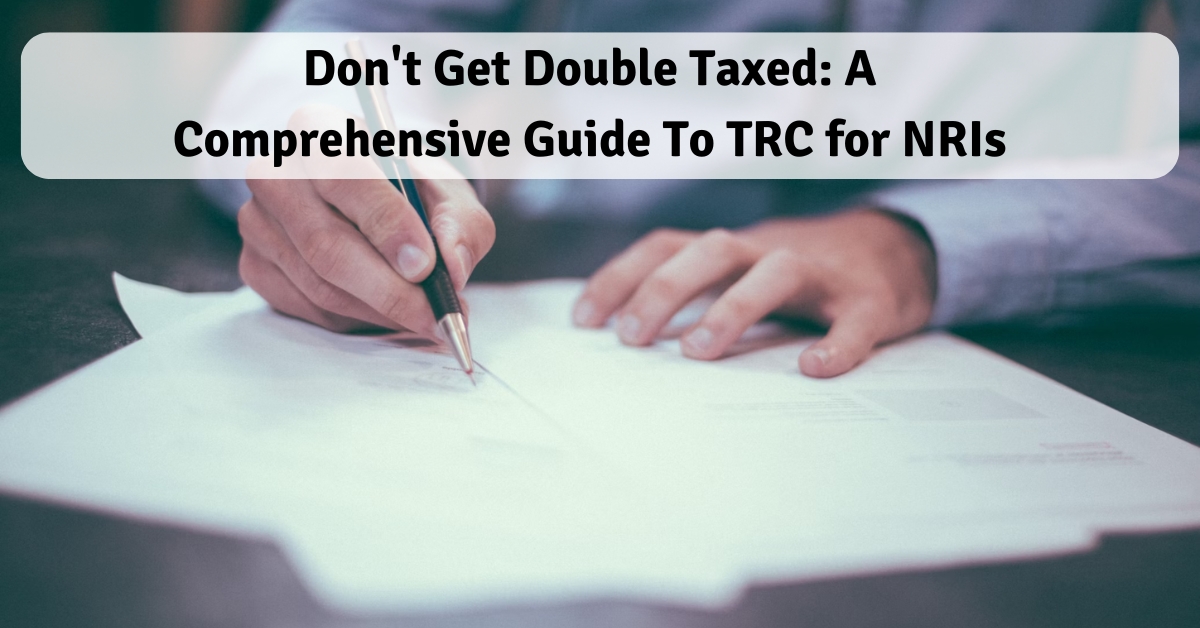Don’t Get Double Taxed: A Comprehensive Guide To TRC for NRIs

Tax residency certificates (TRCs) are crucial documents for individuals and businesses dealing with the intricacies of global taxation. These certificates are crucial in claiming tax treaty benefits and reducing tax liability. This comprehensive guide delves into the tax residency certificates (TRCs), exploring their purpose, importance, and the application process.
What is a Tax Residency Certificate (TRC)?
A tax residency certificate, also known as a tax residence certificate, is an official document provided by the tax authorities of a country. It confirms the tax residency status of an individual or entity within that particular country. This certificate is crucial for establishing eligibility for tax treaty benefits.
Tax Treaty Benefits
Tax treaties are international agreements established between countries with the aim of avoiding double taxation. Double taxation occurs when two different countries tax the same income. Imagine you’re an Indian citizen working in the United States. You earn a salary in the US, and India and the US might claim the right to tax that income. This can be a significant financial burden.
Here’s where tax treaties come in. These agreements typically outline:
- Lowered tax rates are applicable to particular forms of income earned in one nation by inhabitants of the other country.
- Total exemption from taxes on specific types of income, such as interest accrued on bank deposits.
- Assignment of taxation authority between the two nations to prevent dual taxation.
A tax residency certificate proves that you qualify for these benefits under the tax treaty between your country of residence and the country where your income originates.
Why is a Tax Residency Certificate Important?
Double taxation occurs when two different countries tax the same income. This situation can impose a considerable financial strain on individuals and businesses with income spanning multiple countries. A tax residency certificate serves to alleviate this issue.
Here’s how a TRC helps:
- Claims Tax Treaty Benefits: By establishing your tax residency, the TRC allows you to claim benefits outlined in tax treaties between your country of residence and the country where your income originates. These benefits can vary but often include reduced tax rates or complete exemption from taxes on specific types of income.
- Reduces Tax Liability: By claiming tax treaty benefits, a TRC can significantly reduce your overall tax burden. This can prove especially advantageous for individuals who receive income from various countries.
How to Apply for a Tax Residency Certificate:
The process of obtaining a TRC varies depending on the country’s tax regulations. Here’s a general breakdown:
- Identify the Relevant Authority: First, determine the appropriate tax authority in the country where you are considered a tax resident. Typically, this is the national tax department responsible for issuing TRCs.
- Gather Required Documents: Each country has specific requirements for obtaining a TRC. Standard documents may include:
- Completed Application Form: The relevant authority will provide a specific application form that needs to be completed accurately and comprehensively.
- Proof of Identity: Typically, documents such as a passport or national ID card are necessary to confirm your identity.
- Proof of Residence: Documentation such as utility bills or rental agreements is typically required to verify your place of residence. Agreements can demonstrate your residency in the country.
- Tax Residency Documents: Evidence proving your tax residency status in the country, such as tax returns or residency permits, might be necessary.
- Additional Documents: Additional documents like bank statements or employment contracts could be requested depending on the country.
- Submit the Application: After gathering all necessary documents, proceed to submit the application form along with the supporting documents to the specified tax authority. There might be an associated fee for processing the application.
- Verification and Issuance: The tax authorities will verify the information and documents submitted. Upon successful verification, they will issue the TRC.
Key Points to Consider:
- Validity Period: The validity of a TRC typically lasts for one financial year. You may need to renew it annually to continue claiming tax treaty benefits.
- Renewal Process: The renewal process often involves submitting a new application with updated documents, following a procedure similar to the initial application.
Tax Residency Certificate for NRIs
For Non-Resident Indians (NRIs), obtaining a TRC is crucial for claiming benefits under Double Taxation Avoidance Agreements (DTAAs) signed by India with various countries. Here’s a breakdown of the TRC process in India:
- Application: NRIs need to apply for the TRC to the tax authorities of the foreign country where they are considered tax residents.
- Verification and Issuance: The foreign tax authorities will verify the application and documents before issuing the TRC.
- Submission in India: NRIs must submit the obtained TRC to the tax deductor in India, such as a bank or employer, to benefit from reduced tax rates under the DTAA provisions.
- Renewal: NRIs must renew the TRC annually to ensure uninterrupted access to tax benefits under the DTAAs.
Conclusion
Tax residency certificates are valuable tools for individuals and businesses operating internationally. Understanding the concept of TRCs and the application process can ensure proper tax compliance, claim tax treaty benefits, and reduce your overall tax liability. Navigating the complexities of international taxation and maximizing the benefits available through tax treaties necessitates a solid understanding of Tax Residency Certificates (TRCs). These documents are not only crucial for validating your tax residency but also for ensuring that you are not unfairly burdened by double taxation.
However, given the intricacies and variations in tax laws across different jurisdictions, it’s highly advisable to consult with a certified financial planner or a tax advisor. These professionals have the expertise to guide you through the application process, help maintain compliance with the tax regulations, and ensure that you leverage the tax treaty benefits to your advantage. Engaging with a financial expert can provide peace of mind and financial efficiency in managing your international tax obligations.



